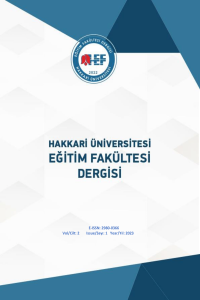Abstract
Eğitimde Bilgi ve İletişim Teknolojilerinin (BİT) kullanımı birçok ülkenin temel odak noktası haline gelmiştir. Son zamanlarda, Türk Milli Eğitim Bakanlığı da BİT'i öğretme ve öğrenme ortamlarına uygulamak için önemli çabalar ve büyük mali yatırımlar yaptı. Ancak, birçok gelişmekte olan ülkede olduğu gibi, BİT araçları, öğretmenlerin BİT'e yönelik algıları dikkate alınmadan sağlanmaktadır. Bu çalışmanın amacı, Yabancı Dil Olarak İngilizce (EFL) öğretmenlerinin eğitimde BİT algısını ortaya çıkarmak ve ardından öğretmenlerin algısı ile öğretmenlerin mesleki deneyimiyle ilgili faktörler arasındaki ilişkiyi keşfetmektir. Bulgular, EFL öğretmenlerinin BİT algısının olumlu olduğunu göstermektedir. Öğretmenlerin algıları, bilgisayar özellikleri, kültürel algılar ve bilgisayar yeterliliği göz önüne alınarak elde edildi. Sonuçlar, öğretmenlerin teknoloji vizyonunun, teknolojiyle ilgili deneyimlerinin ve okula girişini çevreleyen kültürel koşulların önemine işaret etmektedir ve öğretmenlerin BİT'e yönelik tutumları cinsiyete göre farklılık göstermese de yaşa, bilgisayar sahipliğine ve ağırlıklı olarak da mesleki deneyimlerine göre farklılık göstermektedir.
References
- Al-Hoorie, A. H. (2018). Teachers’ beliefs about technology integration into language teaching: A critical review. Teaching English with Technology, 18(3), 23-39.
- Beal, C., & Holcomb, L. (2010). Integrating technology into the classroom: Eight keys to success. Journal of Technology Integration in the Classroom, 2(2), 25-32.
- Fernandez-Lopez, A., & Martinez-Segura, M. J. (2013). Improving reading and writing skills in special education students through the use of iPads. Computers & Education, 68, 661-675.
- Hadfield, M. (2017). Teacher attitudes towards technology. ELT Journal, 71(1), 65-69.
- House, J. (2012). The impact of computer usage on academic performance: Evidence from a randomized trial at the United States Military Academy. Economics of Education Review, 31(6), 145-154.
- Huang, W.H. D., & Liaw, S.S. (2005). Exploring user acceptance of multimedia instruction in a ubiquitous computing environment. Journal of Educational Multimedia and Hypermedia, 14(2), 129-148.
- Jafari, S., & Tabatabaei, O. (2017). Teacher beliefs and concerns about integrating technology into the English language curriculum: A case study of Iran. Teaching English with Technology, 17(3), 1-21.
- Kim, C., & Lee, J. (2014). A study of Korean EFL teachers’ beliefs about, experience with, and willingness to adopt technology in language classrooms. CALICO Journal, 31(2), 181-203.
- Lafford, P. A., & Lafford, B. A. (1997). Technology and foreign language teaching: A review of recent research. Foreign Language Annals, 30(2), 212-224.
- Mercier, C. (2013). The effects of computer-assisted grammar instruction on English language learners’ grammar knowledge and writing skills. Language Learning & Technology, 17(1), 141-165.
- Park, S.M., & Cho, M.H. (2016). Korean secondary school English teachers’ perception and use of ICT in English language teaching. Asia-Pacific Education Researcher, 25(5), 731-741.
- Qing, L. (2007). Pedagogical affordances of multimedia-supported learning environments. Journal of Educational Multimedia and Hypermedia, 16(4), 377-393.
- Tang, K. S. (2018). A study of English teachers’ perceptions and attitudes towards using technology in secondary schools in Hong Kong. International Journal of Pedagogies and Learning, 13(2), 134-146.
- Torff, B., & Tirotta, R. (2010). Assessing the impact of computer-based learning resources on mathematics instruction with urban middle-school students. Journal of Educational Psychology, 102(1), 144-161.
Abstract
References
- Al-Hoorie, A. H. (2018). Teachers’ beliefs about technology integration into language teaching: A critical review. Teaching English with Technology, 18(3), 23-39.
- Beal, C., & Holcomb, L. (2010). Integrating technology into the classroom: Eight keys to success. Journal of Technology Integration in the Classroom, 2(2), 25-32.
- Fernandez-Lopez, A., & Martinez-Segura, M. J. (2013). Improving reading and writing skills in special education students through the use of iPads. Computers & Education, 68, 661-675.
- Hadfield, M. (2017). Teacher attitudes towards technology. ELT Journal, 71(1), 65-69.
- House, J. (2012). The impact of computer usage on academic performance: Evidence from a randomized trial at the United States Military Academy. Economics of Education Review, 31(6), 145-154.
- Huang, W.H. D., & Liaw, S.S. (2005). Exploring user acceptance of multimedia instruction in a ubiquitous computing environment. Journal of Educational Multimedia and Hypermedia, 14(2), 129-148.
- Jafari, S., & Tabatabaei, O. (2017). Teacher beliefs and concerns about integrating technology into the English language curriculum: A case study of Iran. Teaching English with Technology, 17(3), 1-21.
- Kim, C., & Lee, J. (2014). A study of Korean EFL teachers’ beliefs about, experience with, and willingness to adopt technology in language classrooms. CALICO Journal, 31(2), 181-203.
- Lafford, P. A., & Lafford, B. A. (1997). Technology and foreign language teaching: A review of recent research. Foreign Language Annals, 30(2), 212-224.
- Mercier, C. (2013). The effects of computer-assisted grammar instruction on English language learners’ grammar knowledge and writing skills. Language Learning & Technology, 17(1), 141-165.
- Park, S.M., & Cho, M.H. (2016). Korean secondary school English teachers’ perception and use of ICT in English language teaching. Asia-Pacific Education Researcher, 25(5), 731-741.
- Qing, L. (2007). Pedagogical affordances of multimedia-supported learning environments. Journal of Educational Multimedia and Hypermedia, 16(4), 377-393.
- Tang, K. S. (2018). A study of English teachers’ perceptions and attitudes towards using technology in secondary schools in Hong Kong. International Journal of Pedagogies and Learning, 13(2), 134-146.
- Torff, B., & Tirotta, R. (2010). Assessing the impact of computer-based learning resources on mathematics instruction with urban middle-school students. Journal of Educational Psychology, 102(1), 144-161.
Details
| Primary Language | Turkish |
|---|---|
| Subjects | Other Fields of Education |
| Journal Section | Research Articles |
| Authors | |
| Early Pub Date | May 30, 2023 |
| Publication Date | June 3, 2023 |
| Published in Issue | Year 2023 Volume: 2 Issue: 1 |


